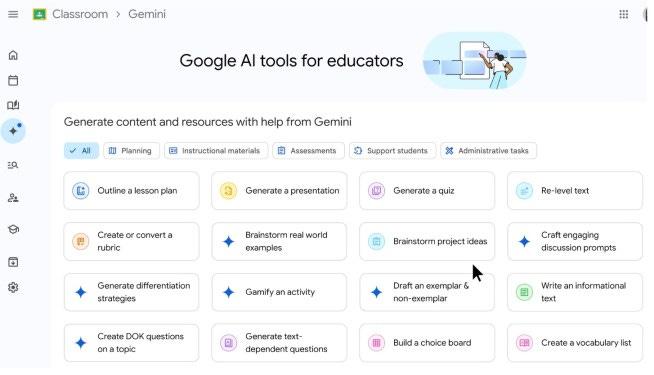GSV's AI News & Updates (07/07/25)
Meta Superintelligence Labs, Apple Outsource Siri, AI VTubers, AI Search Traffic, Gemini Education Tools, Grammarly Acquires Superhuman, AI Fair Use Ruling, Students vs. AI Detectors
General 🚀
Meta Unveils Superintelligence Labs: a new AI division aimed at developing systems that can match or exceed human intelligence. The lab will be co-led by former Scale AI CEO Alexandr Wang, now serving as Meta’s chief AI officer, and Nat Friedman, the former GitHub CEO, who will head AI products and applied research. The move follows weeks of buzz around Meta aggressively poaching elite researchers from OpenAI, Anthropic, and DeepMind.
Here Is Everyone Mark Zuckerberg Has Hired So Far for Meta’s ‘Superintelligence’ Team
OpenAI Leadership Responds to Meta Offers: ‘Someone Has Broken Into Our Home’: As Mark Zuckerberg lures away top research talent to Meta, OpenAI executives say they're ‘recalibrating comp,’ according to an internal memo.
Here’s What Mark Zuckerberg Is Offering Top AI Talent: To compete, Meta is offering some of the most aggressive compensation in tech history—up to $300 million over four years, including fully vested stock in the first year. The unprecedented offers have sent shockwaves through the AI community and forced competitors to rethink how they retain top talent.
Apple reportedly considers letting Anthropic and OpenAI power Siri: In a notable shift from its long-standing preference for homegrown tech, Apple is reportedly considering outsourcing core AI functionality for Siri. Technical setbacks have pushed Apple’s in-house “LLM Siri” launch to 2026 or later.'
OpenAI’s Unreleased AGI Paper Could Complicate Microsoft Negotiations: The partnership between OpenAI and Microsoft in many ways hinges on the definition of artificial general intelligence, creating a tension that has spilled over into OpenAI research that has not been made public.
Leaked docs reveal Meta is training its chatbots to message you first, remember your chats, and keep you talking: Bots will say things like “Hey, thinking of you” or “Will you make a move?” to re-engage users. Each message is customized to persona and past conversations, simulating relationship-like continuity. Meta frames this as both a fix for loneliness (as Zuckerberg has discussed) and a way to boost AI Studio user retention.
AI-powered VTubers are earning millions with fully virtual personalities: VTubers are racking up millions of followers (and millions in revenue) by combining game play, digital charisma, and automation. Bloo, the AI VTuber, boasts 2.5 million subscribers and 700 million views, offering entertaining gaming videos entirely through a Pixar-like digital avatar created and largely run with AI.
AI Is Driving Traffic to News Sites—Just Not Enough to Save Them: Referrals from ChatGPT to news sites have surged 25x since early 2024, per Similarweb -but that growth isn’t offsetting steep losses in search traffic as AI-powered features like Google’s AI Overviews keep users from clicking through.
Cloudflare launches a marketplace that lets websites charge AI bots for scraping: Pay per Crawl lets site owners decide which AI bots can access their content and at what cost, creating a micropayment model for web scraping.
Education and the Future of Work 📚
Google Goes All-In on AI for Classrooms with Gemini Tools and Personalized Learning: At ISTE , Google unveiled over 30 new AI-powered tools under its Gemini suite - including chatbots, lesson planners, video creators, and performance trackers. Gemini for Education is now available to all Google Workspace for Education users.
Custom AI ‘Gems’ for students: Teachers can build personalized AI tutors trained on class materials to support students with challenging subjects.
Interactive study guides: Educators can use Notebook LM to automatically turn lesson plans into custom study aids.
AI reading buddy and video projects: “Read Along” now offers real-time AI reading help, and Google Vids enables students and teachers to create educational videos.
Student analytics and classroom control: New dashboards and tools give educators insight into student progress and help manage content and distractions on Chromebooks.
Privacy and safety enhancements: Google added more controls for managing AI access, data, and security across Gmail and Gemini.
Grammarly to acquire email startup Superhuman in AI platform push: The move signals Grammarly’s deeper push beyond grammar assistance into tools that help users communicate and work more efficiently. Superhuman, last valued at $825 million, currently brings in around $35 million in annual revenue.
How Do You Teach Computer Science in the A.I. Era?: Universities across the country are scrambling to understand the implications of generative A.I.’s transformation of technology. With coding increasingly automated, universities like Carnegie Mellon are reworking curricula to focus on AI literacy, computational thinking, and problem-solving — preparing students for a tech job market where a CS degree is no longer a guaranteed ticket in.
California colleges spend millions to catch plagiarism and AI. Is the faulty tech worth it?: Some faculty and institutions are questioning the reliance on surveillance-based tools, advocating instead for trust, support, and clearer AI usage guidelines.
Chinese students are using AI to beat AI detectors: Students report high AI content scores even on largely self-written work, prompting fear, frustration, and expensive editing services. Popular academic tools like CNKI and PaperPass double as both AI detectors and sellers of “AI-reduction” services. Some students resort to bizarre tactics—like removing punctuation—to trick detectors, often at the expense of clarity and coherence.
No one likes meetings. They’re sending their AI note takers instead.: These AI assistants record, transcribe, and summarize—freeing up time but also raising questions about etiquette, consent, and the erosion of meaningful conversation.
CEOs Start Saying the Quiet Part Out Loud: AI Will Wipe Out Jobs: Ford’s CEO Jim Farley warns that “half of all white-collar workers” could be displaced by AI, one of the bluntest statements yet from outside tech. Amazon and JPMorgan are already cutting headcounts, citing automation’s growing impact on corporate and operations roles.
AI Is Boosting Productivity—So Why Not Shorten the Workweek?
Anthropic launches new effort to study AI’s economic impact: The effort follows CEO Dario Amodei’s stark warning that AI could eliminate half of entry-level white-collar jobs within five years. Anthropic will fund 20–50 global research projects with grants up to $50,000, offering free access to its AI tools to support the work.
America has two labor markets now: Despite solid job growth headlines, the U.S. labor market is deeply bifurcated. Those already employed are staying put in historically secure positions, while job seekers are struggling to land new roles - especially outside of healthcare and education.
Microsoft’s New AI Diagnoses Patients with 4x Greater Accuracy Than Doctors: Microsoft has unveiled a powerful new AI diagnostic tool - MAI Diagnostic Orchestrator (MAI-DxO) - which it claims can diagnose patient cases four times more accurately than human doctors and reduce medical costs by 20%.
White House announces AI education pledge: Participating companies, including Google, Microsoft, NVIDIA, Adobe, and OpenAI, will contribute funding, curricula, tools, and teacher training. The announcement comes ahead of a broader AI “action plan” due by mid-July.
Tech 💻
What I learned trying seven coding agents: Of the seven agents tested, Claude Code stood out for its reliability, with Cursor close behind. Others struggled with bugs, formatting, or context limitations. The key takeaway: AI won’t replace programmers—it shifts their role to defining problems clearly and reviewing results, effectively writing code in English.
Scientists Use A.I. to Mimic the Mind, With Biases, Blind Spots, and All: To better understand human cognition, scientists trained a large language model on 10 million psychology experiment questions. It now answers questions much like we do. The creators admit Centaur doesn’t explain how the mind works but hope it can serve as a benchmark for testing cognitive theories or even inspire new ones as it learns from more data.
MCP: An (Accidentally) Universal Plugin System: MCP started as a tool for AI integration but has evolved into a generic “do-stuff” bridge, essentially the USB-C of software protocols.
OpenAI turns to Google's AI chips to power its products, source says
Safety and Regulation ⚖️
Senate Overwhelmingly Rejects AI Provision in Trump’s Tax Bill: A key provision that would have blocked states from regulating AI was stripped after bipartisan backlash, dealing a rare defeat to Silicon Valley’s push for national preemption. The measure, tied to federal broadband funds, would have undermined local laws on deepfakes, copyright, and algorithmic bias. However, the industry is expected to keep pushing for federal limits as over 1,000 state AI bills emerge.
Did AI companies win a fight with authors? Technically: Meta and Anthropic defended AI training as fair use, but with major caveats. While judges agreed AI training on books can qualify as “transformative” fair use, they also left the door wide open to future litigation.
Denmark to tackle deepfakes by giving people copyright to their own features: The law will allow individuals to demand removal of AI-generated imitations shared without consent—covering both visuals and voice. Realistic digital imitations of artists’ performances will also fall under the rule, with violators subject to compensation claims.
X Will Deploy AI to Write Community Notes, Expand Fact-Checking: These AI-written notes will be vetted by human reviewers before going public, with the goal of scaling the platform’s signature crowdsourced moderation system without sacrificing reliability.
Call Center Workers Are Tired of Being Mistaken for AI: As more workers are asked by strangers if they're bots, surreal conversations are prompting introspection in the industry about what it means to be human.
Other
These Transcribing Eyeglasses Put Subtitles on the World: TranscribeGlass can subtitle conversations in nearly real time and will soon be able to translate languages and tell you when the person you’re talking to you is feeling socially awkward.
China Is Quickly Eroding America’s Lead in the Global AI Race: DeepSeek, Alibaba, Tencent, and Baidu are rapidly expanding their global footprint, particularly in regions like Asia, Africa, and the Middle East. While U.S. models like OpenAI’s ChatGPT still dominate in volume and prestige, Chinese alternatives are attracting with similar performance and drastically lower prices.
Chatbots Are Quietly Writing Biomedical Abstracts—and Scientists Are Taking Notice: A new Science Advances study finds that word patterns—like overusing “crucial,” “delves,” and “significant”—suggest rising AI use in biomedical paper abstracts, with an estimated 13.5% showing signs of AI authorship in 2024, and up to 40% in some journals.






